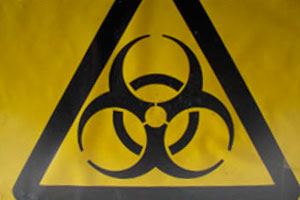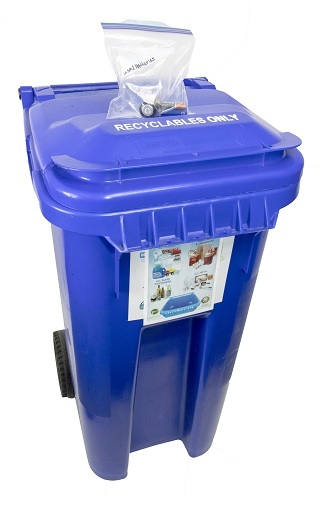
Hazardous Waste Warning
LessIsMore.org works best in modern browsers like Firefox, Safari, Chrome, or Internet Explorer 8. All are free to download and will greatly improve your internet experience. Wastes in this section are dangerous to you and the environment. Handle them carefully and dispose of them properly. Legally, households may not transport more than 15 gallons of wet or 125 pounds of dry hazardous materials. Read about the regulation.
Click below to check out our new video:
Recycle Your Batteries at Curbside!
For those living in the unincorporated area of the County or in the cities of Buellton, Goleta, Santa Barbara, and Solvang, you now have a new option for recycling your batteries. Simply follow the steps below:
- Place the batteries in a zip-top plastic bag
- Put the bag on top of (not inside) your recycling container on your normally scheduled recycling collection day
- For rechargeable batteries, please tape the ends of each battery with clear tape so that the battery poles are not exposed (you can skip this step with single-use batteries)

For more information, check out our Frequently Asked Questions or contact your trash/recycling hauler.
What types of batteries are rechargeable?
Rechargeable batteries come in all shapes and sizes. The most common types are Lithium Ion (Li-ion), Nickel Cadmium (NiCd), Nickel Metal Hydride (NiMH), Nickel Zinc (NiZn), and lead acid.
If you aren't sure if your battery is rechargeable or not, check out our Batteries Explained page for more information.
What are common uses?
You're likely to find rechargeable batteries in cell phones, cameras, laptop computers, and other portable devices.
Why are they hazardous?
As indicated above, rechargeable batteries contain numerous chemicals such as nickel, cadmium, and lead. If thrown in the trash, these chemicals can contaminate surface and groundwater supplies. Additionally, batteries can spark fires if they are damaged, punctured or over-heated. Take a look at what happened when a battery sparked in a trash collection vehicle in Napa, California:
As you can see, it's really important to dispose of batteries correctly!
In California, the Rechargeable Battery Recycling Act requires all retailers that sell rechargeable batteries to take them back and recycle them (a great example of product stewardship). If you notice that a store doesn't seem to be participating, don't be afraid to remind the staff about the law! You could also contact us to let us know!
Where to go
-
All of Santa Barbara County (2)
- Best Buy —
- Safety Kleen — 5310 Overpass Road
-
Carpinteria Area (5)
- Albertsons — 1018 Casitas Pass Road
- Carpinteria Valley Lumber Company — 915 El m Avenue
- City of Carpinteria ABOP Center — 5775 Carpinteria Ave
- CVS Pharmacy — 1036 Casitas Pass Road
- Rite Aid — 801 Linden Avenue
-
Santa Barbara Area (20)
- *Community Hazardous Waste Collection Center — University of California, Environmental Health and Safety Building, Building 565, Mesa Road
- *South Coast Recycling and Transfer Station — 4430 Calle Real
- Apple Store — 928 State Street
- Buena Tool Company — 433 Laguna Street
- CVS Pharmacy — 1282 Coast Village Road
- CVS Pharmacy — 1835 Cliff Drive
- CVS Pharmacy — 222 West Carrilllo Street
- CVS Pharmacy — 1109 State Street
- CVS Pharmacy — 2973 State Street
- CVS Pharmacy — 3939 State Street
- MarBorg Industries — 119 North Quarantina Street
- MarBorg Industries’ Recycling /ABOP Center — 132 Nopalitos Way
- Office Max — 219 East Gutierrez Street
- Rite Aid — 1976 Cliff Drive
- Rite Aid — 825 State Street
- Rite Aid — 35 South Milpas Street
- San Andres Hardware — 635 West Micheltorena Street
- Santa Barbara Home Improvement Center — 415 East Gutierrez Street
- Santa Barbara Public Library System – Montecito Branch — 1469 East Valley Road
- Santa Barbara Public Library System Eastside Branch — 1102 East Montecito Street
-
Goleta & UCSB Area (10)
- *Community Hazardous Waste Collection Center — University of California, Environmental Health and Safety Building, Building 565, Mesa Road
- *South Coast Recycling & Transfer Station — 4430 Calle Real
- Best Buy — 7090 Marketplace Drive
- CVS Pharmacy — 189 Turnpike Road
- CVS Pharmacy — 5875 Calle Real
- Home Depot — 6975 Marketplace Drive
- MarBorg Industries Recycling/ABOP Center — 20 David Love Place
- Rite Aid — 199 North Fairview Avenue
- Staples — 7015 Marketplace Drive
- Walgreens — 5900 Calle Real
-
Santa Ynez Valley (6)
- *Santa Ynez Valley Recycling and Transfer Station — 4004 Foxen Canyon Road
- CVS Pharmacy — 218 East Highway 246
- Harrison Hardware — 1051 Edison Street
- Rite Aid — 616 Alamo Pintado Road
- Santa Ynez Valley Hardware, Inc. — 1665 Mission Drive
- Waste Management — 97 Commerce Drive
-
Lompoc Valley & VAFB (16)
- AL&S, Incorporated — 101 South H Street
- Anderson Recreation Center — 125 W Walnut Ave
- City of Lompoc Fire Station No. 1 — 115 South "G" St
- City of Lompoc Fire Station No. 2 — 1100 North "D" St
- City of Lompoc Household Hazardous Waste Collection Facility — 1585 N. "V" St
- City of Lompoc Landfill (Scalehouse) — Avalon Rd (south end)
- CVS Pharmacy — 1317 North "H" Street
- Home Depot — 1701 East Ocean Avenue
- LampRecycling.com — 2200 Oden Avenue, #100
- Lompoc City Hall Lobby — 100 Civic Center Plaza
- Lompoc Public Library — 501 East North Avenue
- Lompoc Public Library – Vandenberg Village Branch — 3755 Constellation Road
- Vandenberg Air Force Base Commissary — Building 14300, Wyoming Avenue
- Vandenberg Air Force Base Exchange — Building 10400 Community Loop
- Walgreens — 937 North "H" Street
- Walmart — 701 West Central Avenue
-
Santa Maria Valley (19)
- Advanced Wireless — 708 West Betteravia Road
- Battery Systems, Inc. — 201 North Broadway
- Best Buy — 2326 South Bradley Rd
- City of Santa Maria Household Hazardous Waste Facility — 2065 East Main Street
- CVS Pharmacy — 1830 North Broadway
- CVS Pharmacy — 733 East Main Street
- CVS Pharmacy — 2116 South Broadway
- CVS Pharmacy — 4852 South Bradley Road
- Fastenal — 2220 "A" Street
- Home Depot — 2120 South Bradley Road
- Oak Knolls Hardware — 1155 East Clark Avenue
- Office Depot — 1427 South Bradley Road
- Rite Aid — 345 Town Center West
- Rite Aid — 2405 South Broadway
- Sterling Communications — 2232 South Depot Street, Suite G
- Walgreens — 707 North Broadway
- Walgreens — 2399 South Broadway
- Walmart — 2220 South Bradley Road
- Waste Management — 1850 West Betteravia Road
-
Cuyama Valley (1)
- *New Cuyama Transfer Station — 5073 Highway 166
-
Outside Santa Barbara County (19)
- Apple —
- Asbury Environmental Services — 2100 North Alameda Street
- Best Buy —
- BGI — 527 North Rice Avenue
- C.J. Seto Support Services, LLC — 2300 Knoll Dr, Unit G
- Call2Recycle, Inc. — 1000 Parkwood Circle, Suite 200
- Clean Harbors, Inc. — 880 W Verdulera St
- Earth911.com – Information Only — 3481 Plano Parkway
- Eco Lights Northwest Recycling Progam — 2200 6th Avenue South
- Greendisk — 1988 18th Avenue, Suite B
- Hewlett Packard —
- Industrial Waste Utilization — 5601 State Street
- LampRecycling.com — 2200 Ogden Avenue, #100
- Motorola (Race-to-Recycle Program) —
- Panasonic —
- Sharp —
- Stericycle, Incorporated —
- The Big Green Box — 125 East Commercial Street, Suite A
- Waste Management Incorporated, Think Green from Home —
Related Materials
- Green Franchises
- Product Stewardship
- Santa Ynez Valley Collection Event
- Recycling Resource Guide
- Automotive Batteries
- Smoke Detectors
- Portable Electronics Recycling
- Rechargeable Batteries
- Non-Rechargeable Batteries
- Cell Phones/Smart Phones Recycling
- Computers & Peripherals Recycling
- Batteries Explained
- Reduce Electronic Waste
- Portable Electronics Reuse
Related Articles
-
April 7th Hazardous Waste Collection Event
March 03, 2019 by Leslie Robinson - Hazardous Waste Recycling/Disposal -
Keep Your Waste in Check This Holiday Season
December 21, 2018 by Leslie Robinson - Reduce & Reuse -
Holiday Facility Closures
December 20, 2023 by Tori Kampmann - Hazardous Waste Recycling/Disposal -
America Recycles Day November 15th
November 08, 2019 by Leslie Robinson - Recycle -
Latest Annual Report Available for County’s Hazardous Waste Collection Program
January 10, 2024 by Tori Kampmann - Hazardous Waste Recycling/Disposal -
Free Recycling Centers Available for Motor Oil and Filters
March 19, 2018 by Leslie Robinson - Hazardous Waste Recycling/Disposal -
Thomas Fire Clean-Up Tips & Guidelines
-
Thanksgiving Facility Closures
November 22, 2023 by Tori Kampmann - Hazardous Waste Recycling/Disposal -
RRWM’s Annual Waste Management Report Now Available
October 05, 2017 by Alan Nakashima - Recycle -
Easy Battery Recycling at Curbside
May 31, 2019 by Jody Rundle - Hazardous Waste Recycling/Disposal -
Battery Recycling Made Easy
November 30, 2015 by Jody Rundle - Hazardous Waste Recycling/Disposal -
Free Hazardous Waste Events October 5 & 6
September 30, 2019 by Leslie Robinson -
Reminder: Santa Ynez Valley Hazardous Waste Collection Event Postponed
March 23, 2020 by Leslie Robinson -
Hazardous Waste Collection Center Temporarily Closed – Updated 3/30/20
March 30, 2020 by Leslie Robinson - Hazardous Waste Recycling/Disposal -
FREE Household Hazardous Waste Event!
March 31, 2024 by Kaitlyn Haberlin - Hazardous Waste Recycling/Disposal -
February 18th is National Battery Day!
February 14, 2021 by Kaitlyn Haberlin - Hazardous Waste Recycling/Disposal, Electronics -
Hazardous Waste Disposal Options in Santa Barbara County
June 04, 2021 by Tori Kampmann - Hazardous Waste Recycling/Disposal -
“Less Is More” Guide Hot Off the Press
January 18, 2023 by Kaitlyn Haberlin - Recycle, Reduce & Reuse -
2022/2023 Resource Recovery Waste Management Annual Report
February 01, 2024 by Leslie Robinson -
America Recycles Day is November 15!
November 10, 2023 by Kaitlyn Haberlin - Recycle -
Hazardous Waste Center Closed for Easter Holiday
March 25, 2024 by Kaitlyn Haberlin